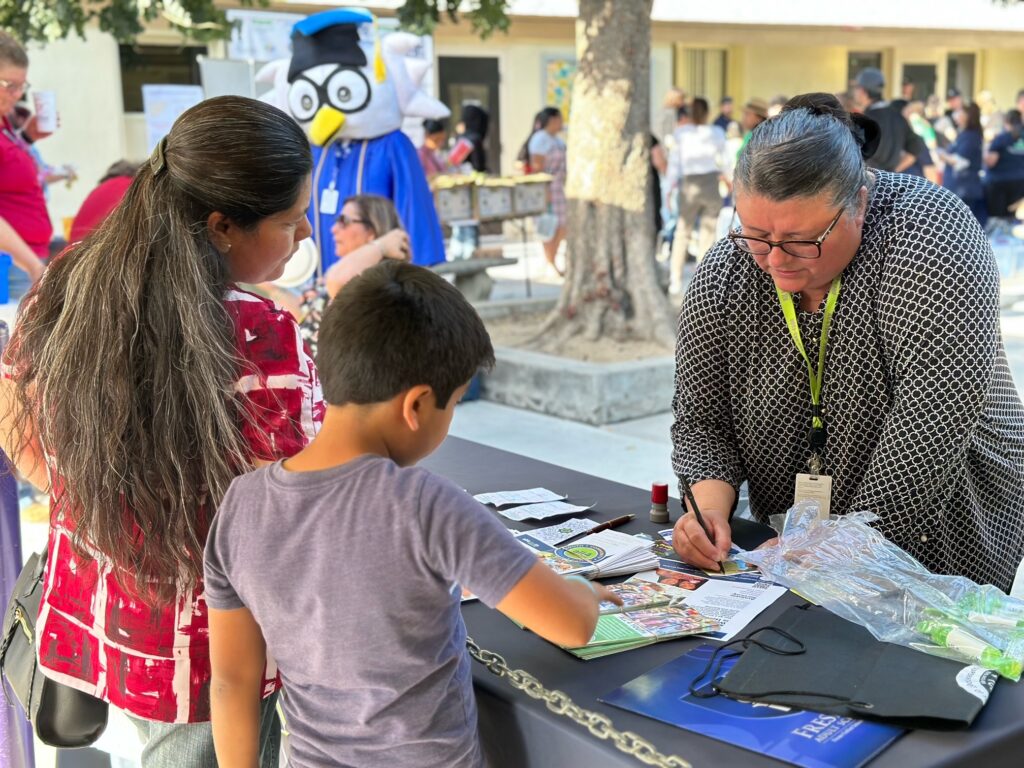
A family gets information at Fort Miller Middle School’s Health and Wellness Fair in Fresno.
Photo courtesy of Eric Calderon-Phangrath
Children’s health advocates are sounding alarm bells about Gov. Gavin Newsom’s proposal to freeze public health insurance enrollment for undocumented adults.
They say the move will put those adults’ children at risk of poor health care and well-being.
California has gradually expanded Medi-Cal, the state’s health insurance for low-income people, to undocumented immigrants, including those with temporary status such as Deferred Action for Childhood Arrivals, or DACA. First, undocumented children were included in 2016, then young adults 19-25 in 2019, then seniors 50 and older in 2022, and finally those ages 26-49 in January 2024.
Before the expansion, undocumented immigrants only qualified for Medi-Cal in emergencies, during pregnancy, and for long-term care. California is paying for the expansion on its own, without federal dollars.
Now, faced with a deficit, Newsom is proposing to freeze new enrollment in Medi-Cal for undocumented immigrant adults and charge current undocumented enrollees a $100 monthly premium starting in 2027.
The Trump administration and Republicans in Congress have been pressuring states like California to stop providing benefits to undocumented immigrants, saying tax dollars should not be used for people who are in the country without permission.
In announcing the proposed cuts, though, Newsom said they were to balance the budget. He said his beliefs have not changed. He touted his promises to expand health care to all, regardless of immigration status, both as mayor of San Francisco and governor of California.
“It’s my value. It’s what I believe, I hold dear. I believe it’s a universal right. And I have for six years championed that,” Newsom said. “This is a tough budget in that respect.”
He said there are now 1.6 million undocumented adults enrolled in Medi-Cal, about 5.3% of total enrollment.
“Our approach was not to kick people off and not to roll back the expansion, but to level set on what we can do and what we can’t do,” Newsom said.
Though undocumented children would not be affected directly by the changes, advocates say that restricting health insurance for undocumented adults will affect their children, the vast majority of whom are U.S. citizens. An estimated 1 in 10 California children have at least one parent who is “undocumented” or has temporary protections from deportation, according to the National Center for Children in Poverty.
“We are disheartened,” wrote Avo Makdessian, executive director of the First 5 Association of California, an organization that represents the state’s county commissions supporting children in the first five years of life, in a statement released after Newsom’s announcement of his revised budget. “When Medi-Cal coverage is scaled back for adults without legal status, children in those families suffer. Decades of research are clear: Healthy parents lead to healthy kids.”
Ted Lempert, president of the nonprofit organization Children Now, said, “Children Now is deeply concerned with the proposed cuts to Medi-Cal.”
“We urge the governor and Legislature to consider that when parents lose coverage, kids are less likely to get the health care they need, so the proposal to hurt parents hurts kids as well,” Lempert said.
Mayra Alvarez, president of The Children’s Partnership, an organization that advocates for children’s health equity, said studies show that when parents become eligible for Medi-Cal, they are more likely to learn about health insurance options available to their children and enroll them.
“This ‘welcome mat’ effect can lead to a noticeable increase in the number of children covered by Medi-Cal or similar programs, even without changes in their individual eligibility,” Alvarez said. “Conversely, when a parent or family member is sick and unable to work or provide care, kids suffer as a result.”
Dolores, 65, is a grandmother who enrolled in Medi-Cal under the expansion for undocumented immigrants. She said losing it would affect not only her but also her children and grandchildren. She did not share her last name because of fear of immigration enforcement.
Months after enrolling three years ago, Dolores suffered a stroke.
“If I hadn’t had Medi-Cal, I don’t know how I would have gotten health care,” she said in Spanish. “It helped me then, and it is still helping me so much.”
Her enrollment in Medi-Cal has also helped her family, including her grandchildren, who live with her, she said. At a health center in Victorville, she has been able to take nutrition classes and Zumba, and she has learned about healthy foods to cook for her family. She said her 4-year-old granddaughter follows her every move, exercises with her, and has benefited from her grandma’s improved health.
“You know children are like sponges — everything they see, they absorb,” she said.
Dolores said she could not afford to pay $100 a month for Medi-Cal, as proposed by Newsom. She has lived in the U.S. for more than 30 years, but after the stroke, she has not been able to return to work.
Alvarez added that when state residents are uninsured, that creates other costs in emergency health care.
“Cynically discriminating against our state’s immigrant communities by rolling back Medi-Cal eligibility is not only unconscionable, but doing so will only result in costs being shifted elsewhere,” she said.
Alvarez recommended that the governor and Legislature balance the budget in other ways, such as “closing corporate tax loopholes and making the wealthy pay their fair share, drawing down reserves that exist for times like this, and scaling back spending in more appropriate places, such as the state’s bloated prison budget.”

دیدگاهتان را بنویسید